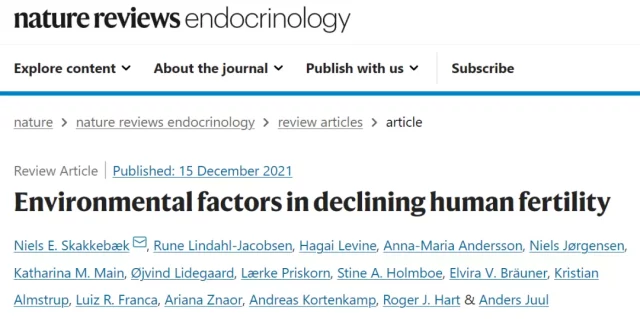The decline in human fertility may be related to fossil fuels
- Normal Liver Cells Found to Promote Cancer Metastasis to the Liver
- Nearly 80% Complete Remission: Breakthrough in ADC Anti-Tumor Treatment
- Vaccination Against Common Diseases May Prevent Dementia!
- New Alzheimer’s Disease (AD) Diagnosis and Staging Criteria
- Breakthrough in Alzheimer’s Disease: New Nasal Spray Halts Cognitive Decline by Targeting Toxic Protein
- Can the Tap Water at the Paris Olympics be Drunk Directly?
The decline in human fertility may be related to fossil fuels
- Should China be held legally responsible for the US’s $18 trillion COVID losses?
- CT Radiation Exposure Linked to Blood Cancer in Children and Adolescents
- FDA has mandated a top-level black box warning for all marketed CAR-T therapies
- Can people with high blood pressure eat peanuts?
- What is the difference between dopamine and dobutamine?
- How long can the patient live after heart stent surgery?
Nature series review: the decline in human fertility may be related to fossil fuels.
Throughout the ages, the population problem has always been related to the stability of human society, and population expansion or underpopulation will eventually lead to social turmoil or even collapse.
However, since the Industrial Revolution , human science and technology have advanced rapidly, productivity has been unprecedentedly improved, and the world’s population has also grown rapidly.
Although the global population has reached the largest ever population of 7.7 billion and is still rising, the current fertility rate has almost halved.
At the same time, the process of industrialization has brought about a large amount of fossil fuel burning.
Recently, researchers from the University of Copenhagen in Denmark published a review article titled: Environmental factors in declining human fertility in the journal Nature Reviews Endocrinology .
This analysis shows that the birth rate in industrialized areas is now below the minimum required to maintain their population .
Chemical pollution caused by burning fossil fuels may play an important role in the decline in the global male sperm count.
The core conclusions of this review paper include:
1. The birth rate in industrialized areas is too low to maintain its population. Although human infertility is more common, the decline in birth rate is usually attributed to socio-economic and cultural factors.
2. In European countries with developed industries such as Denmark, the fertility rate began to decline around 1900. This was decades after the use of fossil fuels, and fossil fuels have always been the driving force of modern industrialization and wealth.
3. The decline in human fertility may be related to exposure to chemicals from fossil fuels, which cause human reproduction problems and cancer.
4. The current human birth rate will eventually lead to a decrease in the population.
Many previous studies have found the presence of fossil fuels in human blood, urine, semen, breast milk and adipose tissue.
Many pollutants from the burning of fossil fuels are endocrine disruptors, which means they can disrupt hormone secretion and harm reproductive health.
Professor Andreas Kortenkamp of Brunel University in the United Kingdom is conducting research and analysis on the degree of sperm quality degradation caused by chemical exposure, and has determined which chemicals have the greatest impact.
Most of the chemicals of concern come from the plastic production process or the combustion of plastic during waste incineration.
In the future, we must establish a link between oil and natural gas, carbon dioxide emissions and chemical pollution.
In July 2020, researchers at the University of Washington in top international medical journal ” The Lancet ” (Lancet) published research paper topic shows that the global total fertility rate in steady decline , expected in 2100, 195 in the world Among the countries and regions, there will be 183 total fertility rates (TFR) that will be lower than the level of fertility replacement.

As the fertility rate continues to fall generally, it is predicted that the world’s population may reach a peak of about 9.7 billion people in 2064, and then drop to about 8.8 billion people in 2100 .
At the same time, earth-shaking changes will take place in the proportion of the world’s workforce, the economic development of various countries, and free immigration.
Asia, Central Europe, and Eastern Europe will become the regions with the fastest population shrinkage, and the population of 23 countries and regions including China, Japan, South Korea, and Italy will be reduced to half of the original population.
Paper link:
https://www.nature.com/articles/s41574-021-00598-8
https://doi.org/10.1016/S0140-6736(20)30677-2
The decline in human fertility may be related to fossil fuels
(source:internet, reference only)
Disclaimer of medicaltrend.org
Important Note: The information provided is for informational purposes only and should not be considered as medical advice.




